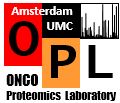Collaboration
Proteomics research requires special OPL expertise and know-how, and is usually performed on a collaborative basis. In each proteomics project, we perform nanoLC-MS/MS for protein identification/ quantification by a dedicated mass spectrometrist and return the results in a user-friendly report. Moreover, we advise in the design stage of the experiment(s), provide support in the wet experimental part prior to mass spectrometry, and assist in statistics and downstream data mining. Furthermore, collaborating scientists/users are trained in the wet lab part so that they can process their own samples for tandem mass spectrometry.
As core facility, OPL operates as a research hotel, with OPL providing expertise, individual training sessions, (help with) dedicated sample preparation protocols, expert-operated nanoLC-MS/MS infrastructure, data analysis support.
In most projects, after instruction, collaborators/users fractionate their own samples by gel electrophoresis and perform in-gel tryptic digestion in a keratin-free laminar flow set-up at the OPL. Subsequent nanoLC-MS/MS analysis of extracted peptides is performed full-service with high resolution and scanning speed on an Orbitrap type of mass spectrometer (e.g., QExactive series ThermoFisher), which is a must for in-depth proteomics of complex biological samples. Data supplemented with dedicated statistics and bioinformatics for data overviews, is returned to investigators in user-friendly Excel files.
Relevant information, workflow and data analysis expertise is available via website- and intranet/email-shared protocols. Collaborators are invited to the weekly OPL meetings to stimulate exchange of experiences and to increase the overall quality of the proteomics experiments. Proteome analyses are offered to users at material and running cost price.
For more information, please see under resources.
How to set up a project/collaboration
Before submitting samples for analysis, one should first discuss the specific project with the head OPL, Dr. Connie Jiménez. Items to be discussed will include the science background, feasibility, expectations and suggestions for appropriate sample preparation, and publication policies (see below). Collaborations are established on a project-by-project basis. Any different or new experiment must be discussed with the head OPL in advance.
Once the project has been approved, a PROteomics Eperiment File (PROEF doc) should accompany all submitted samples and be sent to Dr. Jaco Knol. Each PROEF doc includes a short description of the experiment and its aim, important background information (such as a gel image with an annotated gel slicing scheme), other relevant information (e.g., the biological species from which the samples were derived), and short and unique sample names that match labeling on the submitted tubes (see also instructions in SSS). Send he PROEF doc to Dr. Jaco Knol who will check the file for completeness and then insert it in our mass spec queue system.
Terms for collaboration
Collaborators agree to provide (bi-)annual progress information which is published in the OPL progress report. They also agree to discuss the use of OPL-generated data prior to publication or grant application, and the inclusion of key OPL members as co-authors in any publication using data derived from work performed in/by the OPL. The affiliation to include in all communications/publications is: OncoProteomics Laboratory, Dept. Medical Oncology, VU University Medical Center.
Costs
Proteomics experiments are performed at non-profit pricing at different rates that depend on the situation/ purpose, the number of samples and the type of collaborator. A cost calculation will be made on a per experiment basis.
